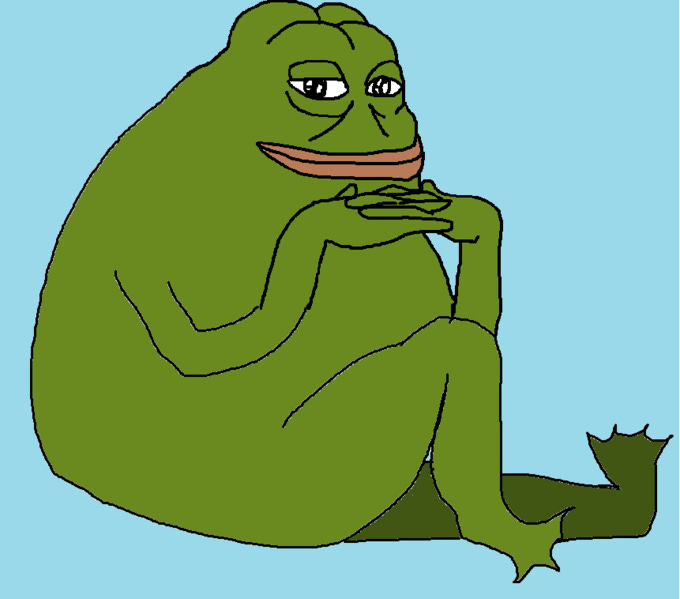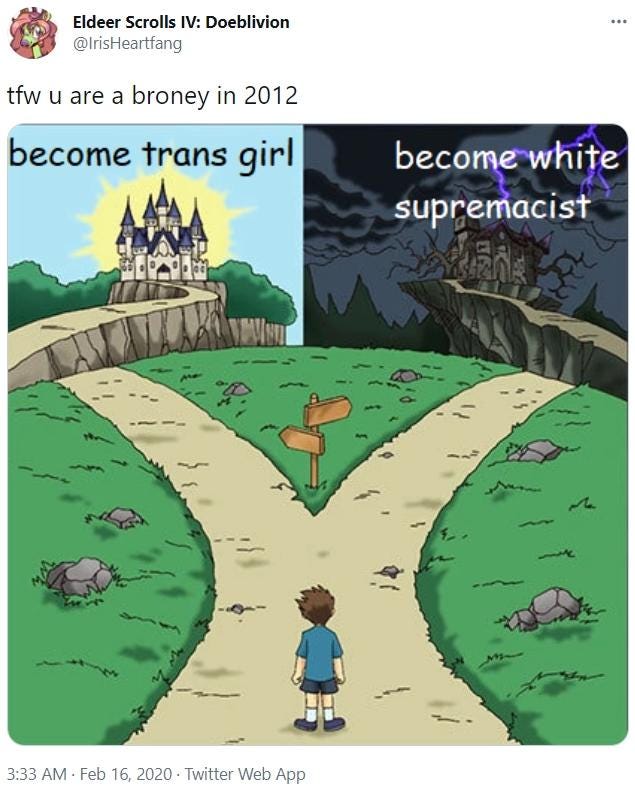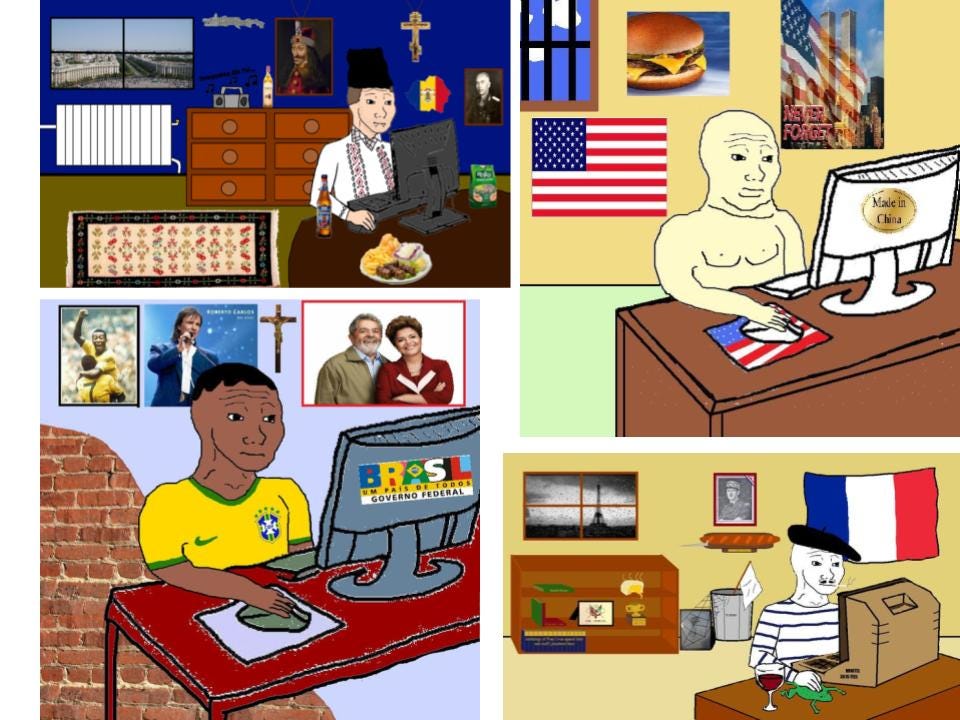a theory of groyperfication
ideas that serve (part one)
In my capacity as an editor at Know Your Meme, I spent 2021-2024 scarring my eyeballs gazing at all manner of internet filth. And so I feel like Cassandra strolling the ruins of Troy when people send me things like this New York Times piece with the tagline “if you want to know where Republican politics is heading, look at the memes.”
So what do the memes actually say?
This post is the first in a series where I will explore American groyperism (the term, named after a white supremacist meme character, which best describes to me the flavor of fascism we’re seeing) from a meme studies perspective, seeking to answer that question.
I’ll tell you the thesis for this first post here, up front: the memes tell us young conservative people are not convinced of fascist ideas, but rather discover those ideas serve them emotionally, psychologically, and materially.
On one level, the “service” groyperism performs for practitioners and adherents is economic: Groyper content is a monetizable online niche, and has been for over a decade. It does well with algorithms that are built to serve extreme content and grab attention. Monetization streams from online gambling, sketchy supplements, prepper gear, and rightwing billionaires are easily available. Platforms which cater directly to groypers — Kick, Rumble, Truth Social, and most of all X — provide a ready infrastructure that no other ideological group has on the internet. To the extent groyper stuff appeals specifically to the young staffer class of the Republican Party, it does so for another set of material reasons: it helps them perform well in their group chats, network with others, and establish movement bonafides.
But more importantly, groyper content has an emotional, psychological and spiritual function. It offers a sense of mooring in the world, an affirming community, purpose, fulfillment. It provides grand narratives to justify action (or inaction). The critique of rightwing “meme magic” by liberals and (to a lesser extent) the left has failed largely because it sees this problem as a question of messaging or policy: if only our kind of people could also go viral, they seem to say, if only we could get the tech companies to act against misinformation. If we intend to beat the groypers, we need ideas that do things for people.
I want to offer case studies of two memes in the Groypersphere, and “ideas that serve.”
Groyper
Groyper is a variant of Pepe the Frog which emerged at some point in the mid-2010s. In 2019, he was adopted by a group of white supremacists led by Nick Fuentes as a kind of mascot.
As I described in my more in-depth post on Groyper:
The chin rested in the hands gives an impression of plotting something — and is an acceleration of normal Pepe’s chin-touching gesture. As a toad, Groyper is plumper and uglier than Pepe — and the name itself sounds gross, something a toad would croak. In full-body depictions, Groyper is often pictured as naked (while Pepe is almost always clothed). On top of the core Groyper body, different garments (such as Confederate uniforms) and attributes (such as far-right symbols) are sometimes placed, the way you would put different outfits and markers on a Barbie doll.
The choice of a purposefully repugnant picture as mascot seems strange. Babytalk slang favored by 4chan (trading “lulz” for laughs, “frens” for friends) also feels corny. We’re used to fascists trying to look tough.
But the point of Groyper, like many rightwing 4chan memes, is to deviate as much as possible — to reject yourself from society, burn the bridge, and embrace the freak brotherhood which awaits you on the other side. The fact that Groyper is ugly and weird according to conventional standards is the point. The scale of Groyper’s deviation from what is acceptable becomes a demonstration of investment, skin in the countercultural game.
But it also shows how Groypers feel society already views them. One thing you realize studying the young online right is how many of them are, for lack of a better word, marginalized. They are often neurodivergent, disabled, queer, overweight, lower economic status, victims of bullying or abusive parenting. To the extent it’s about masculinity, the core demographic that goes groyper are men unable to fit into dominant narratives, through no fault of their own (at least in the beginning). I think of this meme, which (according to Know Your Meme’s documentation) was one of the key examples in the “Dramatic Crossroads” format’s spread:
Some would explain this by calling it horseshoe theory, but what’s happening here is not a political process: it’s a moral and philosophical one. It’s about individuation. I am not arguing that we should cultivate empathy for incels, but that groyperism gives people with an unstable identity a firm ground to stand on. It gives them a narrative to steel themselves with when they walk out into a world they believe is hostile to them. It does something for them, it relieves an ache. It offers them a community on the other side of a radical rejection of “the normal,” but it is not a lasting, authentic, or sustainable community — it is the dark, stormy castle in the meme.
The subset of people who voted for fascists that we might be able to claw back from the abyss did not do so because their rent is too high (although that certainly didn’t help) but because they have come to feel hopelessly aggrieved and left behind. They sought a balm for that wound.
I knocked doors for Kamala and was instructed to tell people about her proposed tax credits for small businesses. I tried to do that a whole day, out in an apartment block in the exurbs. The door would open, I’d say hi, and we’d get to talking about policy and I’d see blank faces. The policy itself might do something for people (provided they have a small business) but the idea does nothing for them. It doesn’t make them feel respected, doesn’t give them something interesting to talk with their friends about, doesn’t teach them something about the world, doesn’t make them feel powerful, doesn’t make them worry less late at night.
Groyperfication happens when young people seek community, affirmation, and answers they can’t find elsewhere. By offering these things, the online right manages to do something for them and prove its value, establish a relationship, and gain a kind of leverage: it convinces them these things are not on offer anywhere else, and the only route to further acceptance and meaning is deeper down the pipeline.
Groyyper content provides a tight-knit community where the ticket to entry is a willingness to post radical, ugly things — which anyone can do. In a lonely society, such a ticket does a lot for people.
Country Feels Wojak
I’ve described Pepe and Groyper as a forms of “collective self-portrait” for certain parts of 4chan, but they are not the only memes to serve this function. The earliest 4chan collective self-portrait would be “Green Anon,” but another is Wojak, who has gone on to serve the same function for the internet at large — and has that same “Barbie doll” dress-up-ability as Groyper. It should be noted that Wojak, in 2025, is not seen as a hate symbol and has had a wide, fascinating career beyond 4chan which these other memes have not.
Country Feels is a Wojak meme which emerged in 2013, when he was still a mostly 4chan phenomenon. It depicts a Wojak sitting at a computer, surrounded by objects that suggest a stereotypical national culture. These objects break into a few different categories: there are decorations on the wall, a view out the window, characteristic foods and drinks, clothing on the Wojak, a sticker on his computer.
I go more in depth in this post about Country Feels. There are a few ways to read these memes. Taking the American one on the upper right as an example (because, after all, I’m American) you see the Wojak’s obesity and the poster of a burger. The window shows a clear blue sky crossed by prison bars, and also seems to represent something: the American Wojak is not actually free. One way to read the meme might be to say a non-American made it to insult America — and there’s certainly many Country Feels memes which feel xenophobic. But my gut tells me an American made this one self-deprecatingly. Of course, I can’t know because it’s anonymous.
Then, there are some which seem less ironic — for example, the Romanian one or the Brazilian one, which seem to just compile Romanian and Brazilian things, showing a kind of national pride or emphasizing a culture’s uniqueness. It’s impossible to know, however, if actual Romanians, Brazilians, French, or Americans posted these memes because everyone’s anonymous.
But what strikes me most is how, while the objects surrounding Wojak change, what remains the same is the solitary Wojak and his computer. It seems at first that the meme is about celebrating or mocking specific national cultures, but what it’s really about is 4chan culture and how it transcends borders.
Regardless of how extremely Romanian, Brazilian, or American a Wojak is, these differences are only decor: he isn’t looking at his flag or his national food, he’s looking at his screen — which, presumably, is displaying a 4chan imageboard (or maybe Reddit’s /r/4chan, where this meme took off and found a wider audience). The meme shows national identity playing second fiddle to an online subcultural identity.
It also tells them they are not alone. They are one among many Wojaks at their computer. Country Feels reminds me of a lot of Communist propaganda art, and its vision of pan-nationalist class solidarity — but rather than being unified by the hammer they hold, these diverse proletarians are unified by the computer they stare at. In this sense, Groyperfication also offers a vocabulary to contextualize and discuss a core experience of modern life: being terminally online, living through the screen. You see no attempt at this in mainstream liberalism, other than the disciplinarian “ban all phones in school” people.
Groyperfication offers a political vision that is actually larger than the nation-state. It is, strangely enough, a cosmopolitan creed. The far right is global, Trumpism is not just an American thing. A memorable n+1 essay recently described a career fair for prospective ICE agents where the big draw was the chance to “travel the world.” What it also does for people is expand the boundaries of their lives, exposing them to new people and ideas, satisfying their curiosity.
In two ways, I disagree with my own framing here, and want to lay out these caveats:
A significant amount of the Groyper phenomenon is explained by people being racist, sexist, and transphobic. There is a dumb, cruel wall of prejudice which you can’t scale with material analysis or cultural theory — and major institutions, many allegedly “liberal,” served to enable these forces. And the election of Trump and leaders like him around the world offered a permission structure. To an extent, Groyperism’s success is not a story about the internet at all, but a chapter in a longer history of hate and complicity.
It’s too late to be talking about how we can arrest the rise of Groyperism. This battle is over, and they won. It is now time to do things that prevent ICE from ripping people out of their homes. Liberals should stop funding blogs and start funding mutual aid, strike funds, and protest-oriented activism. Or better yet, they should step aside and let the grassroots take charge and do for people what they couldn’t. I’m essentially writing a letter to 2020 here, begging us to have done better.
But what does hold true, for sure, is this: people in 2025 want security, patronage, and certainty. We want to laugh, believe ourselves to be correct about things, and feel respected by others. Observing memes over the last decade teaches you that non-fascist culture needs to start doing those things, or else more and more of us will go groyper.




Very well done.
I have empathy for incels, though. (In the initial meaning of 'involuntary celibate'.) Nobody tells young men how to date, and sharing information about how to become attractive is considered wrong. It's either Andrew Tate or 'just be yourself and eventually you'll find someone'.
Excellent--as you often have, this illuminates and articulates phenomena that have been hard to describe and therefore to begin to address. Thanks!